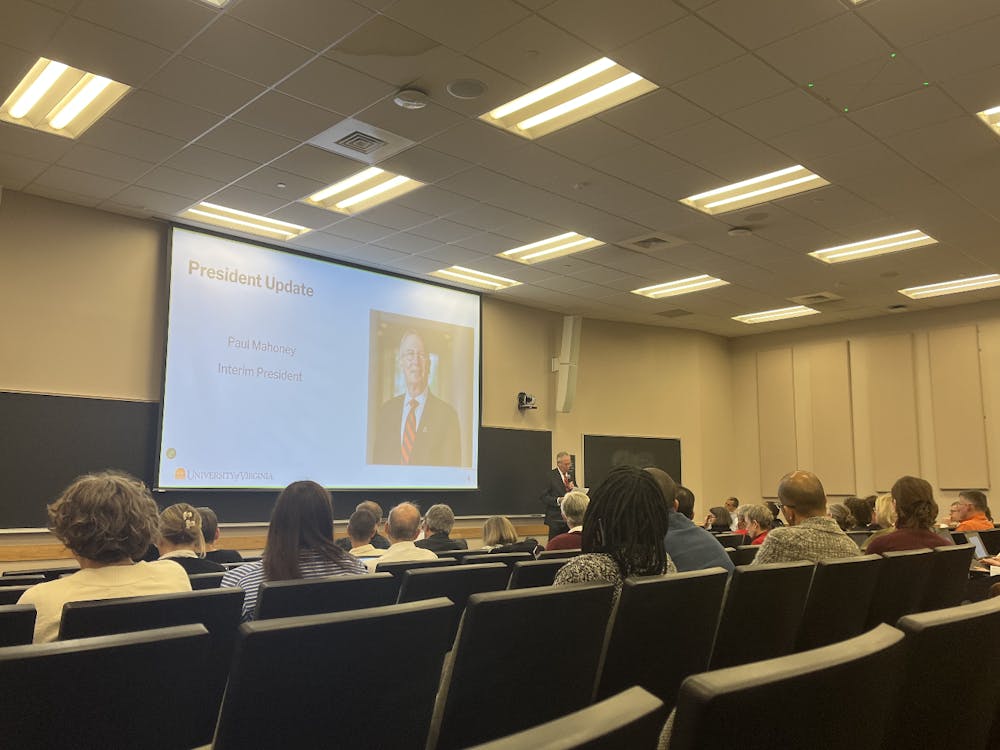Enron. Tyco. ImClone. The list of companies involved in corporate scandal seems to be getting longer and longer. In the wake of such intense media scrutiny of the situation, investors have to wonder how best to ensure greater corporate accountability.
To address the issue, University students and professors attended a Friday panel discussion on "Corporate Accountability and Financial Reporting in the Post-Enron Era." The panel was part of a series of discussions sponsored by the PricewaterhouseCoopers Center for Innovation in Professional Services at the Commerce School.
Each of the five panelists agreed that corporate accountability was a problem. The system of corporate accountability "has swerved rather severely off course," said panelist Rebecca McEnally, vice president of the Advocacy Association for Investment Management and Research.
Panelists offered a number of explanations and solutions for the problem.
The situation is the result of "the broad failure of fiduciary responsibility," McEnally said. "There's lots of blame to go around."
McEnally suggested that managers, boards of directors and auditors need to work in the best interest of investors. Regulators need to provide a reasonable framework of regulation so the public can have confidence in the corporate business world.
McEnally added that the media needs to ensure their stories reflect the realities of the situation.
"We need to look at the process at the beginning," said Joseph F. Berardino, former CEO of Andersen Worldwide. We "don't improve the process by looking at the back-end of the process."
Instead, companies should look at the "root cause and risk management issues," and prevent problems before they become uncontrollable, he said.
Berardino said a good example of this was before the so-called "Y2K bug" when people were taking precautions for any glitches that might occur with the turn of the millennium.
Berardino also said some companies get into trouble because they are "myopically focused on the earnings per shares number."
It is important for companies to consider other factors, such as liquidity ratios, the velocity of change in the industry, quality of management, conflicts of interests, as well as transparency of the financial statements, Berardino said.
Some panelists suggested that corporate boards of directors should be independent. Directors should not just be "cronies of the CEO," said panelist F. Drake Johnstone, Davenport & Company's first vice president of research.
On the whole, the panelists expressed the view that unbiased directors and those with fresh ideas should hold corporate executives and auditors accountable.
There "has to be dogged pursuit of knowledge in the board room if there is going to be control," PricewaterhouseCoopers Partner Matthew D. Brockwell said.
Johnstone suggested getting rid of quarterly corporate press releases, so that companies would just release earnings on their detailed 10Q forms that are filed with the Securities and Exchange Commission.
Panelists debated if there should be so much senior executive compensation. "I would be nervous if there was no stock option," Berardino said.
Panelist Henry Dudley Jr., president of Riggs & Company, said he thought senior executives should get stock options, if they were not in excess. Johnstone said he favored a shareholder vote about stock options for senior executives.
Some panelists said they doubted that simple rules could solve the dilemma.
The solution will require "a cultural change and behavioral change, as well as a structural change," Brockwell said.
Others agreed. "I don't think we can legislate ethics," Dudley said.
Dudley also said he worries about the prospect of large amounts of corporate regulations and feared that it would sacrifice flexibility.
"I think that's the direction we are headed, but some changes are possible," he added.
"It's not easy. There is a big corporate economy with complicated businesses. There's no big fix. It will be trial and error and it will be on-going," Brockwell said.






